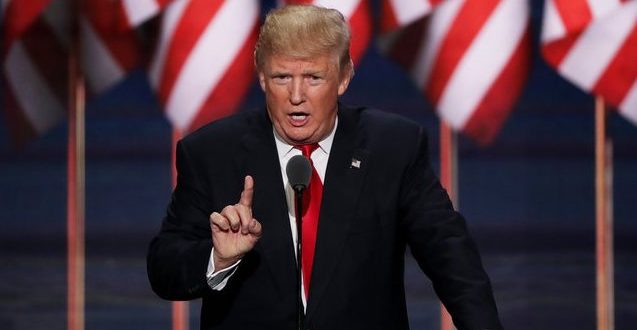Donald Trump has pledged to halt immigration from countries “compromised by terrorism” as he accepted the Republican presidential nomination.
Mr Trump’s 75-minute speech was designed to set the tone for the general election campaign against Hillary Clinton, an answer to Republicans who say the best way he can unify the divided party is to detail why she should not be elected on 8 November.
Trump made his entrance with patriotic music playing in the background and a crowd chanting “Trump, Trump” after his eldest daughter, Ivanka, introduced him.
“When you have my father in your corner, you will never again have to worry about being let down,” Ivanka Trump told the American people in her speech.
In her speech, Ivanka focused on advocating for women’s rights including equal pay and maternity leave, as an attempt to appease the women voter base Trump had previously alienated.
Trump formally accepted the party’s presidential nomination, saying “I humbly and gratefully accept your nomination for the presidency of the United States.”
The theme of the night was “Make America One Again,” but Trump would have to first try to unite the divided party for a chance of winning in the coming general election.
In a heavily scripted speech, Trump covered issues including law and order, national security, immigration, trade, tax cuts and the threat of terrorism. He then proclaimed that “I am your voice” to the American people.
Trump also launched a series of attacks on his Democratic Party rival Hillary Clinton, accusing her of keeping “our rigged system in place” and leaving “death, destruction and weakness” as her legacy.
According to a leaked draft speech transcript published by the website Politico.com, Trump seldom went off script and when he did, he often repeated what he had just said and added an exclamation point.
Trump’s speech was consistent with the theme of many of his previous speeches, where he painted the current state of the country as bleak, dangerous and constantly under attack, and saying only he could solve the various problems if elected president.
But he again failed to provide any detailed policies to explain how he would manage to realize all his promises.
There were also notable different talking points from speeches made by previously nominated Republican candidates, including protecting the LGBT (lesbian, gay, bisexual and transgender) community and little mention of his faith and religious beliefs.
The speech also deviated from his routine rhetoric in several points. He did not resort to calling his opponent degrading nicknames, he did not reiterate his proposal of a total ban on Muslims into the country, and he did not echo the crowd’s chants of “lock her up” when talking about Clinton, but said “We’ll defeat her” instead.
The longer-than-usual speech marked the end of a year-long dramatic nomination campaign journey and the start of the uphill battle for the 270 electoral votes he needs in November.
Eleven months ago, Trump descended on an escalator inside his Fifth Avenue Trump Tower in New York to announce his candidacy for the GOP presidential nomination. Nobody had thought he could go this far.
In the months after that, he managed to constantly make inflammatory remarks against women, Muslims, Mexicans, foreign countries, belittle his opponents by calling them “Lying Ted,” “Little Marco” and “Crooked Hillary,” and still plowed through all the controversies that ensued.
On Tuesday, Trump was officially declared the party’s presidential nominee after a state-by-state vote.
But the win had come at the cost of a seriously divided Republican Party, where many prominent figures of the party, including two previous Republican presidents and two previous Republican presidential nominees refused to attend his crowning party.
In the four-day event, anti-Trump factions in the party tried to push through a roll call vote to change convention rules, which would allow some of the delegates who had voted for Trump to recast their votes to other candidates.
On Wednesday, Texas Senator and former rival Ted Cruz publicly refused to endorse Trump and told voters instead to “vote your conscience,” a move local newspapers deemed a “civil war.”
The division has been alarming to the establishment members of the party.
Republican National Committee Chairman Reince Priebus spoke at the event, applauded traditional Republican values and called for party unity by saying “let’s stand united as Republicans, let’s get to work to expand our Republican majorities.”
Agencies/Canadajournal

 Canada Journal – News of the World Articles and videos to bring you the biggest Canadian news stories from across the country every day
Canada Journal – News of the World Articles and videos to bring you the biggest Canadian news stories from across the country every day

